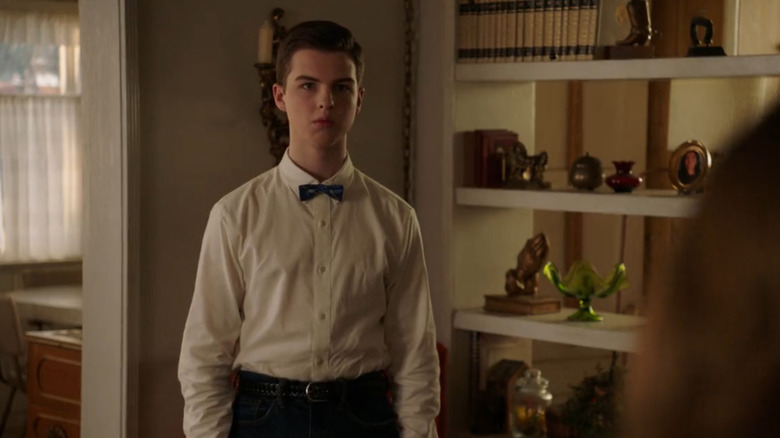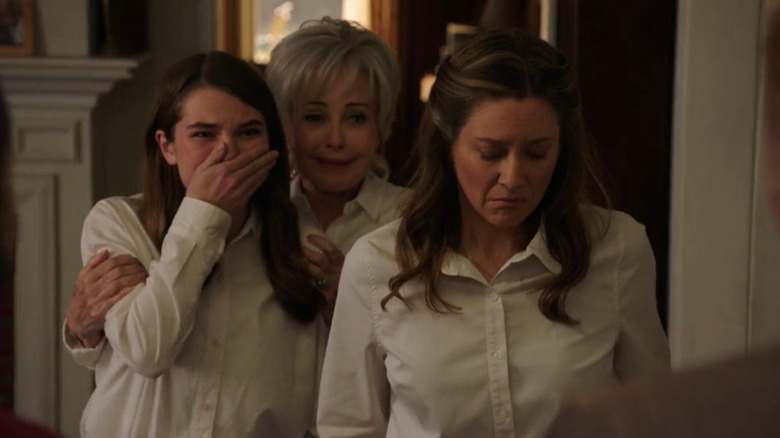Sheldon Cooper, the nerdy protagonist on the middle of “Younger Sheldon” and “The Huge Bang Concept,” tends to react to issues a bit in a different way than the folks round him, and it is by no means extra evident than within the season 7 episode “A New Dwelling and a Conventional Texas Torture.” On the finish of the episode, younger Sheldon (Iain Armitage) and his household are advised that Sheldon’s father George (Lance Barber) has died of a heart attack, and whereas his mom, sister, and grandmother all start to cry, Sheldon simply seems form of shocked and sits down, his face clean. To somebody on the skin, it would appear as if he does not care, however as a result of Sheldon is a few unspecified taste of neurodivergent, his response is definitely about as intense of an emotional one as attainable.
Sheldon would proceed to have a unique response to George’s dying than the remainder of the household, showing much more indifferent than regular within the heartbreaking penultimate and finale episodes, however there was a superb cause behind all of it. In an interview with TV Line, Armitage broke all of it down and defined that Sheldon was completely grieving — he was simply doing it in his personal manner.
Sheldon shut down as an alternative of crying out
Whereas Sheldon’s relations have been outwardly devastated by the information and started crying, Sheldon was so overwhelmed that he merely shut down as Armitage defined:
“The factor about Sheldon is it is much less of an exterior stone-face, I feel you understand for different characters perhaps that stone facade is crumbling from the skin in, for Sheldon it is from the within out. One of many first takes we did I sat down within the chair the best way they needed me to and I form of began to let my face fall and virtually not fairly cry however you understand form of begin to get emotional and [the director] mentioned do not even try this, it is a thousand occasions extra heartbreaking if we see that Sheldon cannot even start to think about processing or understanding that to the purpose the place his thoughts will not attempt; it is virtually as if he is heard them speaking concerning the climate and I actually preferred that interpretation. “
Within the scene, we are able to see Sheldon’s eyes subtly transfer round as his mind tries to grasp what he is simply heard, and it is completely soul-crushing as a result of we’re watching a younger man notice that he’ll by no means see his father once more. George and Sheldon had a complicated relationship that might have gotten higher with time, however they tragically by no means received that probability and it helped form the usually jaded grownup Sheldon finally turned on “The Huge Bang Concept” (the place he was performed by Jim Parsons, who narrated “Younger Sheldon” and had a cameo in the finale). Everybody grieves in a different way, and for Sheldon, it looks as if his mind jumped straight to denial. Perhaps in the future, lengthy after the occasions of even “The Huge Bang Concept,” he’ll lastly discover acceptance.
Sheldon Cooper, the nerdy protagonist on the middle of “Younger Sheldon” and “The Huge Bang Concept,” tends to react to issues a bit in a different way than the folks round him, and it is by no means extra evident than within the season 7 episode “A New Dwelling and a Conventional Texas Torture.” On the finish of the episode, younger Sheldon (Iain Armitage) and his household are advised that Sheldon’s father George (Lance Barber) has died of a heart attack, and whereas his mom, sister, and grandmother all start to cry, Sheldon simply seems form of shocked and sits down, his face clean. To somebody on the skin, it would appear as if he does not care, however as a result of Sheldon is a few unspecified taste of neurodivergent, his response is definitely about as intense of an emotional one as attainable.
Sheldon would proceed to have a unique response to George’s dying than the remainder of the household, showing much more indifferent than regular within the heartbreaking penultimate and finale episodes, however there was a superb cause behind all of it. In an interview with TV Line, Armitage broke all of it down and defined that Sheldon was completely grieving — he was simply doing it in his personal manner.
Sheldon shut down as an alternative of crying out
Whereas Sheldon’s relations have been outwardly devastated by the information and started crying, Sheldon was so overwhelmed that he merely shut down as Armitage defined:
“The factor about Sheldon is it is much less of an exterior stone-face, I feel you understand for different characters perhaps that stone facade is crumbling from the skin in, for Sheldon it is from the within out. One of many first takes we did I sat down within the chair the best way they needed me to and I form of began to let my face fall and virtually not fairly cry however you understand form of begin to get emotional and [the director] mentioned do not even try this, it is a thousand occasions extra heartbreaking if we see that Sheldon cannot even start to think about processing or understanding that to the purpose the place his thoughts will not attempt; it is virtually as if he is heard them speaking concerning the climate and I actually preferred that interpretation. “
Within the scene, we are able to see Sheldon’s eyes subtly transfer round as his mind tries to grasp what he is simply heard, and it is completely soul-crushing as a result of we’re watching a younger man notice that he’ll by no means see his father once more. George and Sheldon had a complicated relationship that might have gotten higher with time, however they tragically by no means received that probability and it helped form the usually jaded grownup Sheldon finally turned on “The Huge Bang Concept” (the place he was performed by Jim Parsons, who narrated “Younger Sheldon” and had a cameo in the finale). Everybody grieves in a different way, and for Sheldon, it looks as if his mind jumped straight to denial. Perhaps in the future, lengthy after the occasions of even “The Huge Bang Concept,” he’ll lastly discover acceptance.





















